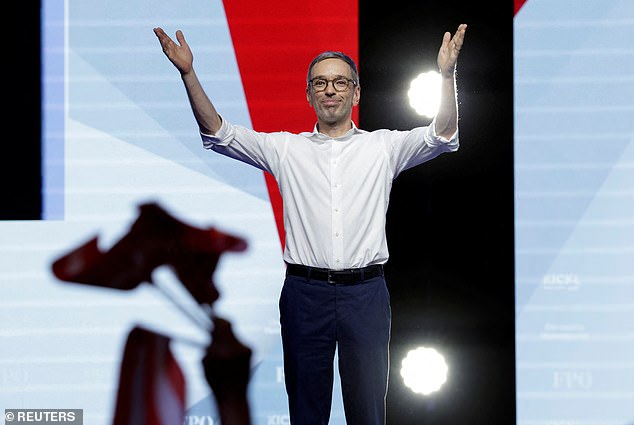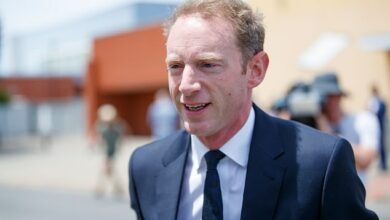Austria’s far-right party is expected to win elections this week after it pledged to close borders and end aid to Ukraine: leader called for expulsion of ‘non-ethnic Europeans’ who fail to integrate

Austria’s far-right Freedom Party (FPOe) looks set to win this week’s election, with its leader trying to win votes by promising to close the country’s borders and end aid to Ukraine.
Herbert Kickl, 55, has vowed to transform the country into “Fortress Austria.” He criticizes the current government’s “failed migration policy” and blames it for the Islamic terror plot at a Taylor Swift concert.
He and his party have promoted ‘remigration’, the controversial concept that the expulsion of immigrants of non-European ethnic background who are perceived as having failed to integrate.
Critics also see him as soft on Vladimir Putin and he has repeatedly called for an end to Austrian aid to Ukraine, arguing that the country should remain neutral.
He is a fan of Viktor Orban, Hungary’s pro-Putin president, and has accused the EU of “warmongering” and said he would veto sanctions against Russia if he became chancellor.
A victory for the FPÖ in Sunday’s election would be the first time a far-right party has won a parliamentary election in Austria since the fall of the Third Reich.

Freedom Party leader Herbert Kickl has promised to transform the country into ‘Fortress Austria’
The FPOe was founded in 1956 as an alternative to the two largest parties in Austria. Its first two leaders were both former Nazis and high-ranking SS officers.
Later it became an established part of the Austrian political landscape and when populist Jorg Haider seized power, it began to appeal to voters with its anti-immigration message.
Under Kickl, the FPOe has quickly gained support and is likely to come to power as the senior partner in a new coalition with the conservative Austrian People’s Party (OVP).
Since he took over the party in 2021, the party has risen in the polls to around 27 percent, up from 18 percent three years ago.
The populist leader was previously a behind-the-scenes figure in the party. In the 1990s, he helped reshape the party and in 2000, the party entered the Vienna government.
Buoyed by discontent over rising inflation, Kickl took advantage of the declining popularity of the governing coalition of conservatives and Greens.
In the European elections in June, the FPOe topped the polls nationwide for the first time, with more than a quarter of the votes.
Kickl was a professional politician and studied philosophy, history, communication science and political science before joining the FPOe in 1995.

The FPOe is likely to come to power as a senior partner in a new coalition with the conservative Austrian People’s Party (OVP). Pictured: Leader of the People’s Party (OEVP) and Austrian Chancellor Karl Nehammer

Since Kickl (center) took over the party leadership in 2021, the party has risen in the polls to around 27 percent
However, little is known about his private life and he has kept a low profile. Voters appreciate his neat and reliable demeanor, unlike his flamboyant predecessors.
But his dull, modest image contrasts with his venomous rhetoric, which he skillfully uses against political opponents. For example, he calls President Alexander Van der Bellen a ‘senile mummy’.
“He is the rudest politician in the country,” said journalist Nina Horaczek, who analyzed Kickl’s speeches in a book published this year.
“It’s a way to discredit those who think differently,” she added.

Visitors queue to enter the Parliament building in Vienna, Austria, September 23, 2024
However, Kickl has also avoided debates and interviews, criticizing the media for their “lack of objectivity.”
He declined AFP’s request for an interview.
Instead, he has relied on social media. The FPOe sparked outrage last year with a video peddling an extremist conspiracy theory that white Europeans are being replaced by migrants.
Also visible was the balcony of Vienna, where Adolf Hitler gave his speech when he triumphantly returned to his homeland in 1938 after the annexation of Austria by the Nazis.
The FPÖ was founded by former Nazis, and Kickl has often used terms that refer to the party’s troubled past, calling himself the future ‘Volkskanzler’ – the people’s chancellor – as Hitler was called in the 1930s.
“It is a targeted provocation with two goals: to get people talking and to send a clear signal” to the most radical currents within the party, Horaczek said.
Kickl denies that ‘Volkskanzler’ is a Nazi reference and claims that several politicians have claimed the term for themselves in the past.
The far-right leader has never made a secret of his close ties to extremist groups, having already expressed his support for the Identitarian Movement in 2016.
He has also embraced the far-right concept of “remigration”, which calls for the expulsion of people of non-European ethnic backgrounds because they have failed to integrate.
In 2018, when Kickl was interior minister, he led a controversial raid on the country’s secret service, during which documents detailing ties between the FPOe and extremist circles were seized.
And in April, prosecutors opened a corruption investigation against him after allegations he embezzled government money to pay for advertising in exchange for perceived favorable coverage.
Last year, Kickl appeared on posters in his native Carinthia, dressed in a green military-inspired parka and bearing the slogan: ‘Fortress Austria – close borders, guarantee security.’
For the upcoming national elections he has donned a suit, but he has kept the slogan.




